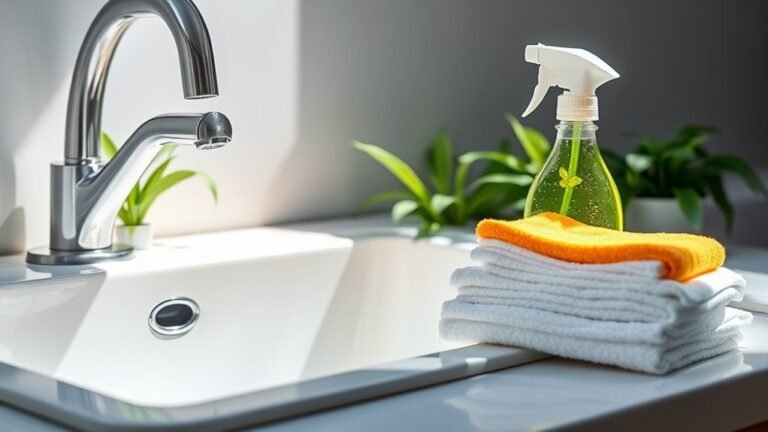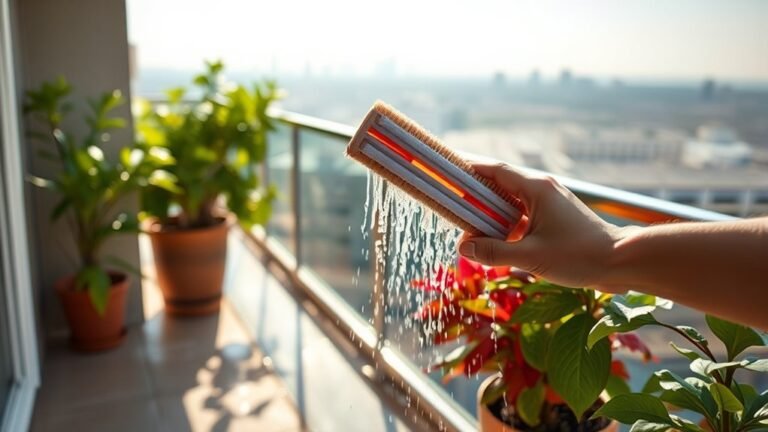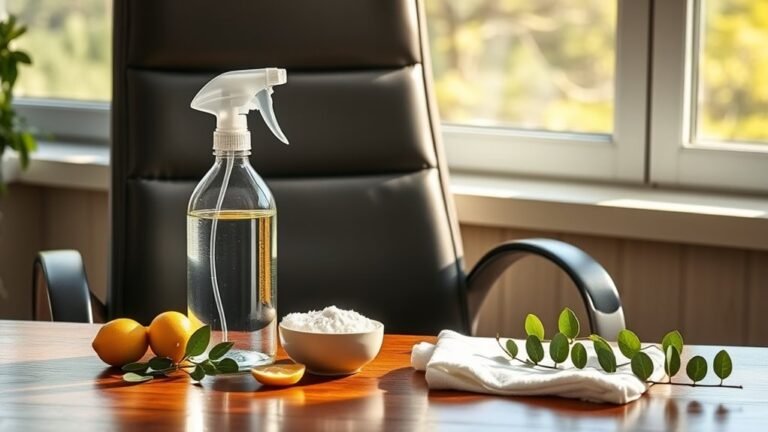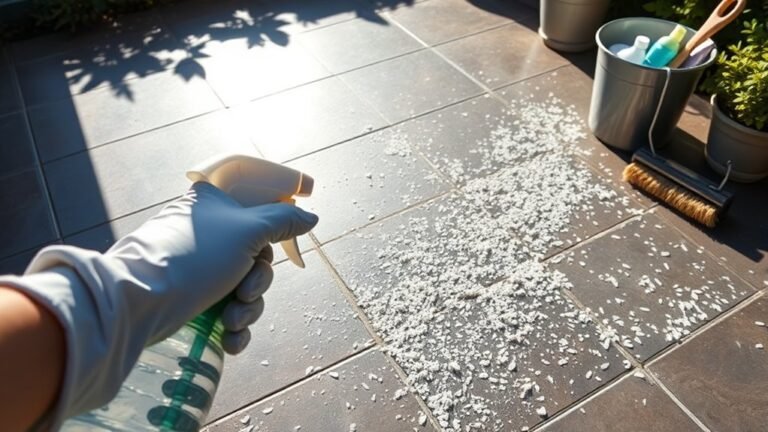Using Essential Oils to Clean Carpet
You can freshen and clean your carpets naturally by using essential oils like lavender, lemon, or tea tree mixed with water in a spray bottle. These oils not only add a pleasant scent but also help remove stains and kill bacteria, making your home healthier without harsh chemicals. Adding a few drops to your vacuum bag can maintain freshness between cleanings. To guarantee safety and avoid damage, it’s wise to test oils on a small carpet area first. There’s plenty more to explore on using oils effectively for carpet care.
Benefits of Using Essential Oils for Carpet Cleaning
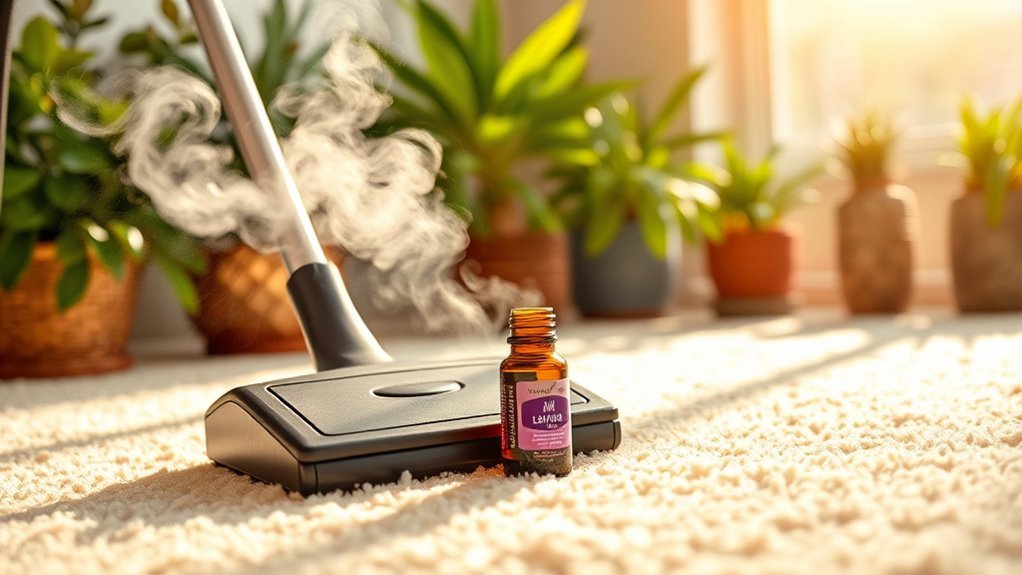
Anyone looking to freshen up their carpets will find essential oils a natural and effective option. You’ll appreciate how they minimize your environmental impact compared to harsh chemical cleaners. Choosing essential oils means you’re embracing a greener lifestyle, reducing toxins in your home and waste in the environment. Plus, they’re surprisingly cost-effective. A little goes a long way, so you won’t need to buy cleaning products frequently. This saves you money and gives you the freedom to maintain your carpets without relying on expensive, synthetic solutions. By using essential oils, you’re taking control of your cleaning routine in a way that aligns with your values—prioritizing health, sustainability, and budget-conscious choices while keeping your living space fresh and inviting.
Best Essential Oils for Freshening Carpets
Choosing the right essential oils can make all the difference when freshening your carpets. You want natural scents that not only smell great but also promote a sense of freedom in your space. Blending oil combinations can elevate the aroma, giving your carpet a unique, rejuvenating vibe. Here’s a quick guide to some of the best essential oils for carpet freshening:
| Essential Oil | Benefits |
|---|---|
| Lavender | Calming, fresh scent |
| Lemon | Uplifting, deodorizing |
| Tea Tree | Antimicrobial, clean |
| Eucalyptus | Invigorating, fresh |
Mixing these oils lets you customize your carpet’s scent, keeping your home naturally vibrant and inviting.
How to Prepare Essential Oil Carpet Spray
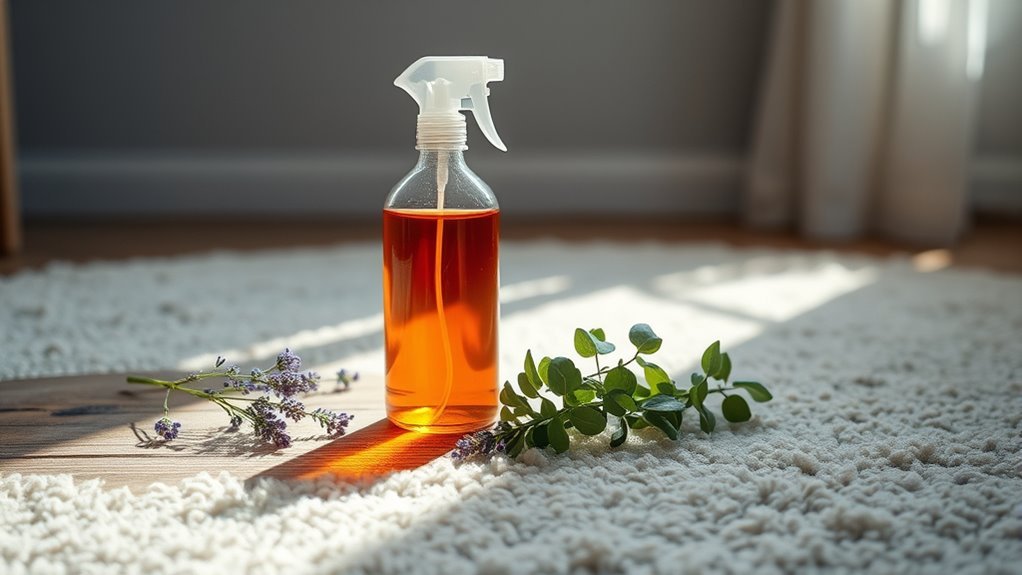
Creating your own essential oil carpet spray is simpler than you might think, and it only takes a few ingredients. Start with a clean spray bottle—glass works best to preserve the oils’ potency. Fill it about three-quarters full with distilled water, then add 10-15 drops of your favorite essential oils. Feel free to experiment with scent combinations like lavender and lemon or eucalyptus and peppermint to find what frees your senses. Shake the bottle gently to blend everything together. Before each use, give it a quick shake since oils and water separate naturally. This DIY spray lets you refresh your carpets without harsh chemicals, giving your space a fresh, personalized scent you control. It’s freedom in a bottle, ready to uplift your home anytime.
Using Essential Oils to Remove Carpet Stains
When tackling carpet stains, choosing the right essential oils can make all the difference. You’ll want to create a DIY cleaner with oils known for their stain-fighting properties, like lemon or tea tree. Plus, applying the solution correctly guarantees you get the best results without damaging your carpet.
Best Oils for Stains
Although essential oils are often praised for their pleasant scents, they also pack a powerful punch against carpet stains. When you want to tackle stubborn spots, citrus oils like lemon or orange should be your go-to. Their natural acidity breaks down grime and lifts stains without harsh chemicals, giving you freedom from toxic cleaners. Lavender oil is another superstar—it not only helps fade stains but also leaves a fresh, calming aroma in your space. Both citrus and lavender oils work best when applied quickly after a spill, so you can prevent stains from setting in. Using these oils lets you clean effectively while enjoying a natural, eco-friendly approach that respects your desire for a healthier, freer lifestyle.
DIY Essential Oil Cleaner
Now that you know which oils work best for stains, you can make your own natural carpet cleaner at home. Mix 1 cup of white vinegar with 2 cups of warm water, then add 15-20 drops of your favorite essential oils like lemon or tea tree. This blend offers eco friendly alternatives to harsh chemicals while leaving behind a gentle, natural fragrance. Pour the mixture into a spray bottle, giving you freedom to tackle carpet stains without worry. This DIY cleaner is simple, effective, and safe for your family and pets. By choosing essential oils, you’re embracing a cleaner, greener lifestyle that respects both your home and the environment. Enjoy the satisfaction of fresh carpets and a natural scent, all from your own hands.
Application Tips and Tricks
Since essential oils are concentrated, applying them correctly can make all the difference in effectively removing carpet stains. You’ll want to explore various carpet application methods that suit your stain type and carpet fabric. For instance, diluting essential oils in water or a mild carrier like vinegar allows for gentle yet effective stain removal. When using essential oil techniques, always test a small hidden area first to avoid damage or discoloration. Spray or dab the mixture lightly on the stain, then blot with a clean cloth—never rub, as it can spread the stain. Let it sit briefly to penetrate, then rinse with water and dry thoroughly. Mastering these methods gives you freedom to clean naturally and confidently without harsh chemicals.
Incorporating Essential Oils Into Vacuum Cleaner Bags
One simple way to freshen your carpet while vacuuming is by adding a few drops of essential oil directly into your vacuum cleaner bag. This method lets you enjoy your favorite essential oil blends with every pass, enhancing your cleaning routine without extra effort. Just remember to check your vacuum’s manual for proper vacuum maintenance to avoid damage.
| Essential Oil Blend | Benefit |
|---|---|
| Lavender & Eucalyptus | Relaxing and antibacterial |
| Lemon & Peppermint | Energizing and deodorizing |
| Tea Tree & Rosemary | Antimicrobial and fresh |
| Orange & Cinnamon | Uplifting and warm scent |
Essential Oil Carpet Deodorizing Powder Recipe
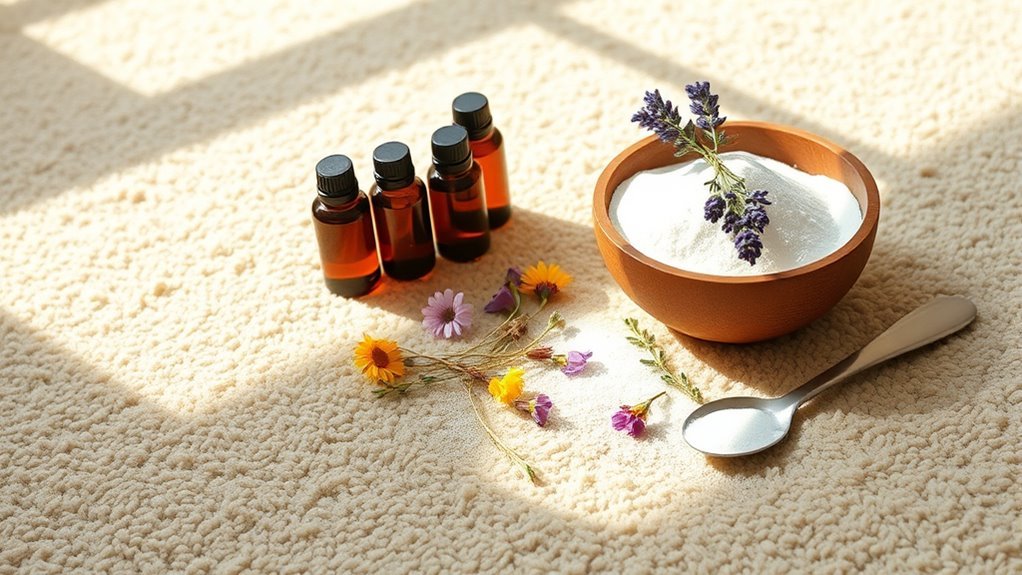
You’ll need a few simple ingredients to make your own essential oil carpet deodorizing powder. I’ll guide you through the mixing process to get the right balance of scent and freshness. Plus, I’ll share tips on how to apply it effectively for the best results.
Ingredients Needed
Gathering the right ingredients is key to making an effective essential oil carpet deodorizing powder. You’ll want simple, natural cleaning components that work well together. Start with baking soda as your base—it’s fantastic for absorbing odors and freshening carpets. Next, add a small amount of cornstarch to help the powder cling to carpet fibers, enhancing its deodorizing power. For the scent and cleaning boost, choose your favorite essential oil blends; lavender, lemon, eucalyptus, or peppermint are popular choices that bring freshness and natural antibacterial properties. Make sure to use pure, high-quality essential oils to maximize the benefits. With these ingredients, you’re not only cleaning naturally but also reclaiming control over what goes into your home environment, embracing freedom from harsh chemicals.
Mixing Instructions
Now that you have your ingredients ready, it’s time to combine them into a powerful carpet deodorizing powder. Start by measuring your base, typically baking soda, using a 1-cup ratio. For essential oils, stick to mixing ratios of about 20-30 drops per cup of baking soda—this keeps the scent strong but not overwhelming. When adding oils, use blending techniques like mixing them first with a tablespoon of cornstarch or salt to disperse the oils evenly. Gradually blend this mixture into the baking soda, stirring gently to avoid clumps. This guarantees your powder stays free-flowing and effective. By mastering these mixing ratios and blending techniques, you’ll create a deodorizer that refreshes your space naturally and gives you the freedom to customize scents however you like.
Application Tips
Once your deodorizing powder is ready, applying it correctly is key to maximizing its effectiveness. Sprinkle the powder evenly over your carpet, focusing on high-traffic areas to maintain lasting carpet freshness. For stubborn odors or stains, don’t hesitate to use the powder as a spot treatment—just apply a bit more directly to the affected area. Let it sit for at least 15-20 minutes to absorb odors fully, then vacuum thoroughly. This method not only refreshes your carpet but also gives you the freedom to customize your cleaning routine with your favorite essential oils. Remember, consistent use keeps your space smelling clean and inviting without harsh chemicals, allowing you to enjoy a naturally fresh home every day.
Safety Tips When Using Essential Oils on Carpets
Before applying essential oils to your carpet, it’s important to take certain precautions to protect both your flooring and your health. Essential oils are powerful, and without care, you might trigger sensitivity reactions like skin irritation or respiratory issues. Always dilute oils properly, and avoid overusing them to keep your space safe and enjoyable. If you have pets, consider their safety too—some oils can be toxic to animals, so keep them away from treated areas until the scent fades. Ventilate your room well during and after application to reduce inhalation risks. By respecting these safety tips, you maintain your freedom to enjoy a fresh, clean carpet while protecting yourself and your furry friends from unwanted side effects.
How to Test Essential Oils on Carpet Fabric
To guarantee your carpet fabric reacts well to essential oils, you should test a small hidden area first. This simple step helps you avoid any unwanted discoloration or damage. Start by applying a drop of diluted essential oil to the inconspicuous spot using a cotton swab or cloth. Wait 24 hours to observe any changes in color, texture, or odor. This testing method ascertains the essential oil is compatible with your carpet’s fabric before a full application. Different fibers react differently, so fabric compatibility is key to preserving your carpet’s look and feel. By taking time to test, you maintain your freedom to clean effectively without risking harm, making your carpet care routine both safe and satisfying.
Combining Essential Oils With Baking Soda for Cleaning
Although baking soda is a powerful natural cleaner on its own, combining it with essential oils can boost its effectiveness and leave your carpet smelling fresh. You just mix a cup of baking soda with 15-20 drops of your favorite essential oils. Experiment with scent combinations like lavender and eucalyptus for relaxation or lemon and peppermint for an energizing vibe. Sprinkle the mixture evenly over your carpet, let it sit for 15-30 minutes to absorb odors and dirt, then vacuum thoroughly. This simple blend not only tackles grime but also infuses your space with a personalized aroma, giving you the freedom to refresh your home naturally and confidently. Using baking soda with essential oils is a smart, customizable way to keep your carpet clean and inviting.
Maintaining Carpet Freshness With Regular Essential Oil Treatments
You can keep your carpet smelling fresh and clean by applying essential oils regularly, which also helps eliminate odors and bacteria. Using simple techniques like mixing oils with water in a spray bottle or combining them with baking soda makes it easy to maintain freshness. Let’s explore the best essential oils to use and how often you should apply them for ideal results.
Benefits of Essential Oils
When you regularly treat your carpet with essential oils, you’ll notice it stays fresher and more inviting for longer. These oils offer more than just a pleasant scent—they bring real benefits that free you from harsh chemicals.
- Health benefits: Essential oils can naturally reduce allergens and bacteria, improving your indoor air quality and supporting your well-being.
- Aromatic properties: Their rich, natural fragrances uplift your space, promoting relaxation and a sense of freedom from synthetic smells.
- Long-lasting freshness: Unlike temporary sprays, essential oils gradually release scent, keeping your carpet and home feeling clean and vibrant.
Application Techniques
The benefits of essential oils are clear, but knowing how to apply them properly makes all the difference in keeping your carpet fresh. For spot cleaning, dilute a few drops of your chosen oil with water in a spray bottle and target stains directly. For deep cleaning, mix essential oils with baking soda to sprinkle on your carpet before vacuuming. Regular treatments keep odors at bay and maintain freedom from harsh chemicals.
| Technique | Best Use |
|---|---|
| Spot Cleaning | Target stains quickly |
| Deep Cleaning | Refresh entire carpet |
| Spray Method | Easy, quick application |
| Baking Soda Mix | Odor elimination |
| Routine Use | Maintain lasting freshness |
Stick to these methods, and your carpet will stay fresh, inviting, and chemical-free.
Frequently Asked Questions
Can Essential Oils Damage Carpet Fibers Over Time?
You might wonder if certain cleaning methods harm your carpet fibers over time. When it comes to carpet maintenance, protecting those fibers is key to keeping your space fresh and inviting. While many natural products are gentle, some can cause discoloration or weaken fibers if not used properly. To enjoy freedom in your cleaning routine without damage, always test small areas first and dilute strong substances to maintain fiber protection effectively.
Are Essential Oils Effective Against Carpet Mites and Allergens?
Did you know that dust mites cause allergic reactions in about 10% of the population? When it comes to carpet maintenance, essential oils can offer natural allergy relief by reducing allergens and repelling carpet mites. While they’re not a complete solution, using oils like tea tree or eucalyptus can complement regular cleaning, helping you keep your space fresh and free from irritants—giving you more freedom to enjoy your home comfortably.
How Do Essential Oils Compare to Commercial Carpet Cleaners?
When comparing natural alternatives like essential oils to commercial carpet cleaners, you’ll find essential oils offer a gentler, eco-friendly option with fewer harsh chemicals. Their cleaning effectiveness varies—they’re great for freshening and mild stain removal but might not tackle tough grime as powerfully as commercial products. If you value freedom from chemicals and want a natural approach, essential oils can be a revitalizing choice, though sometimes you’ll need a stronger cleaner for deep messes.
Can Essential Oils Prevent Mold Growth in Carpets?
You might find that essential oils can help with mold prevention thanks to their natural oil properties, which often include antifungal and antimicrobial effects. While they won’t guarantee a mold-free carpet, using oils like tea tree or eucalyptus can support your efforts to keep mold at bay. Just remember, good ventilation and moisture control are key—these oils are a great natural boost, but you’re still the one in charge of creating a mold-resistant space.
What Is the Shelf Life of Essential Oil Carpet Cleaning Solutions?
You’ll find that the shelf life of essential oil carpet cleaning solutions typically ranges from six months to a year, depending on storage. Over time, the oil potency naturally declines, so keeping your mixture in a cool, dark place helps maintain its effectiveness. Don’t let it sit too long—once the scent fades or the solution changes color, it’s time to refresh. This way, you stay empowered to clean freely and effectively.



